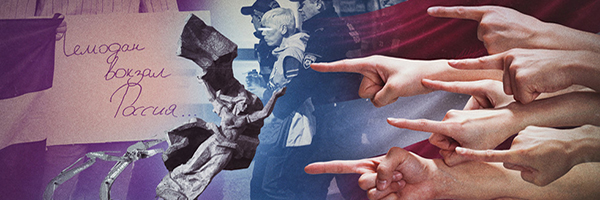‘Fear and suspicion’: An EU state deports thousands of native-born Russian-speakers as the West turns a blind eye
 Christina Sizova, RT, February 3, 2024 —
Christina Sizova, RT, February 3, 2024 —
Despite its population falling off a cliff since independence, Latvia is trying to drive out even more people.
Latvia has been persecuting its Russian-speaking residents for many years. Today, thousands of of them face deportation. They include an 82-year-old retiree – whose family resides in the Baltic republic – and a 63-year-old woman who has lived in Latvia her entire life. Russian President Vladimir Putin has said that these actions pose a threat to his state’s national security.
Latvia intends to punish residents who have not learned the national language by deporting them. To remain in the country, they must pass a test. The requirement also applies to those with ‘non-citizen’ status – people who permanently reside in Latvia (sometimes from birth) but don’t have the same rights as others.
The Latvian authorities have recently tightened their policy with regard to national minorities, supposedly due to concerns that arose after the start of Russia’s military campaign in Ukraine. However, the trend towards further restricting the rights of the Russian-speaking population in Latvia has been developing for a long time.
Throwing out the old people
Every day, new reports appear about people being expelled from the country. As a result, Putin has instructed his government to propose measures that would ensure the rights of ethnic Russians who permanently reside abroad, and to take additional measures with regard to the repatriation of Russian nationals who are illegally deported from foreign states. These steps should be taken by July 1, 2024.
Latvia is attempting to deport thousands of Russian-speaking people – and apparently, these ‘purges’ affect not only newcomers who have recently applied for a residency permit, but people who have lived in the country their entire lives.
One such person is 82-year-old retiree Boris Katkov. On January 12, he found out that the Latvian authorities had ordered him to leave the country. The Russian Embassy expressed indignation, pointing to the decision of the Latvian Ministry of the Interior, according to which “the elderly man has been considered a threat to national security and was sentenced to deportation, without the right to return to the country.”
Russian diplomats called the verdict “absolutely inhumane” and stated that it violates the ‘non-separation principle’ for families, since the man’s wife, children, and grandchildren can remain in Latvia. The governor of the nearby Kaliningrad Region, Anton Alikhanov, has instructed local authorities to provide Katkov with housing.
The New York Times recently told the story of Russian-speaking widow Nina Marcinkevica, who was born in Latvia 63 years ago, when the Baltic republic was still part of the Soviet Union. She married and raised a family there, and has never lived anywhere else. Nina resides in the predominantly Russian-speaking city of Daugavpils in the eastern part of the country. In the fall, she received an official notice stating that she had lost her rights to residency, her state pension, and medical care. “You must leave the territory of the Republic of Latvia by November 30, 2023,” the letter stated.
The woman has heart and lung problems, as well as high blood pressure. She has nowhere to go. When she found out that she was about to be deported, she collapsed from shock and cried in bed for the next three days.
The Latvian authorities have the opportunity to expel Marcinkevica due to her Russian citizenship. Although the woman had never lived in Russia, she received it under a simplified program for former compatriots to receive a Russian pension. As she explained, in Russia, the retirement age is lower than in Latvia.
For the same reason, according to the publication, 68-year-old Tatyana Matveeva, who has lived in Latvia since 1980, became a Russian citizen. She also faces deportation after failing two Latvian language exams.
“Nobody ever asked me to speak Latvian before,” she said. “If I were 20, I could learn, but my memory is shot.”
Russians have no place here
These people are just a few of the many Russian-speaking residents of Latvia who may soon be expelled from the country. On December 18, the head of Latvia’s Office of Citizenship and Migration Affairs, Maira Roze said on TV3 that the country could deport over 1,000 people who had not passed the language test or applied for a residence permit by November 30. She said that many Russians are still trying to file their documents, but Riga is convinced that they should leave.
“They didn’t work [in the country], they’ve got no family [here], in other words, there’s no reason for them to stay in Latvia,” Roze said.
According to Roze, around 2,500 Latvian residents “didn’t do anything” or didn’t pass the language exam. The office will also check whether some of these people returned to Russia via other European countries.
Approximately 15,500 Russians have applied for a permanent residence permit in Latvia and 3,000 for a temporary permit.
Over 3,200 Russian nationals living in Latvia received notifications about potential deportation in early October, according to the news portal Rus.lsm.lv. The Office of Citizenship and Migration Affairs sent letters about the expiration of the residence permit to people who did not apply for a permanent EU residence permit.
According to Latvian law, permanent residence permits expired last September, so anyone who received the notification should have left the country within two months, before November 30.
Exiled for speaking Russian
Poor knowledge of the Latvian language is one of the reasons for deportation. After the amendments to the procedure for extending residence permits for Russians and Belarusians came into effect last fall, Marcinkevica, and others like her, had to pass a language test. To receive a residence permit, people had to provide a certificate of language proficiency by September 1, 2023. Those who failed the test were allowed to try again within two months and their right-to-remain was extended until the end of the year. People who did not take the exam at all could receive a temporary residence permit and do it later.
Later, several additional amendments were adopted. Russians who resided in Latvia were given two additional years to take the language test and obtain a new residence permit, provided that they attempted to take the exam and failed, or had a serious reason for not showing up.
As a result, about half of the approximately 50,000 Russian citizens who are currently living in Latvia must pass the language test and undergo a security check if they want to stay in the country.
A total of 13,147 Russian citizens registered for the test, but only 11,300 people showed up; 39% of applicants passed it the first time around. Over 6,500 people signed up to take it again.
In early August, the head of the Saeima [Latvian Parliament] Commission on Citizenship, Migration and Social Cohesion, Ingmars Lidaka, warned that about 6,000 Russians residing in Latvia who did not apply for an extension of their permanent residence permit and failed, or didn’t sit, the language exam in order to obtain permanent resident status in the EU, would receive a letter from the Office of Citizenship and Migration Affairs in September with a request to leave Latvia. “About 5,000-6,000 [people], according to my predictions. These are people who have expressed no wish to take the test or get a temporary residence permit,” Lidaka said, according to Rus.LSM.lv.
These people will not only lose their residence permits, but will not be eligible to receive certain benefits in Latvia, including pensions. However, according to Deputy Interior Minister Vilnis Vitolins, “people have the right to obtain any other residence permit – a visa or a temporary residence permit, if eligible.”
Vitolins noted that people will be given three months, so they can “leave without haste.”
“If a person remains in Latvia illegally, eventually the time will come when the government agencies find out about it and, accordingly, will remind them to leave,” he said, adding that there is no criminal liability for violating the order, but fines may be imposed.
At the same time, Latvian officials stress that the new measures will not lead to mass expulsions and that only 3,500 Russian citizens who currently reside in Latvia have failed to file the necessary documents. “We are not rushing to expel anyone,” Ilze Briede, the head of the Latvian Migration Division, said. She added that no one has been deported and this probably won’t happen in the near future. The deadline for fulfilling the requirements has been extended to 2025.
In September, Russia’s commissioner for human rights, Tatyana Moskalkova, warned that she would appeal to the UN and the Council of Europe regarding the plans to deport Russian-speaking citizens from Latvia.
“Our Baltic neighbors have set out on a course of purposefully pushing the Russian-speaking population out of the country… I believe that deliberately creating conditions that force [Russian] citizens to leave Latvia is a gross violation of human rights,” Moskalkova wrote on her Telegram channel.
The problem with ‘non-citizens’
The persecution of Russian-speaking residents is not a new thing in Latvia – it has been an issue for decades. On October 15, 1991, the Latvian Supreme Council adopted a resolution titled ‘On the Renewal of the Rights of the Citizens of the Republic of Latvia and on the Fundamental Principles of Naturalization’, and the legal status ‘non-citizen’ was established.
Initially, the status ‘non-citizen’ was given to permanent residents whose ancestors moved to Latvia after 1940, when the country became part of the Soviet Union. In 1991, there were over 740,000 non-citizens in Latvia. As of 2020, there were 197,888 non-citizens (10.4% of the country’s residents), most of whom were ethnic Russians, Ukrainians, and Belarusians.
Non-citizens in Latvia face many restrictions– they have no voting rights, cannot be elected to government positions, and cannot participate in referendums; however, they can join Latvian parties and support them financially. Non-citizens also cannot hold certain jobs. They cannot be firefighters, police officers, lawyers, notaries and their assistants, judicial officers, and heads of security staff. Presently, the rights of citizens and non-citizens vary in more than 80 different aspects.
To obtain citizenship, non-citizens must undergo the naturalization procedure, which includes language and history tests. In 2004, the Naturalization Department conducted a survey in which the majority of non-citizens who wished to obtain citizenship called the naturalization process humiliating and difficult.
People interviewed by the New York Times complained that Russian speakers are often denied citizenship, and senior citizens are forced to learn Latvian, which they find difficult. The article itself is titled ‘In a Baltic Nation, Fear and Suspicion Stalk Russian Speakers’.
A side effect of the conflict
According to the newspaper, the decision to deport Nina Marcinkevica and others who hold Russian passports was a side effect of the conflict between Russia and Ukraine. A member of the Latvian Parliament, nationalist Janis Dombrava, said that Russia’s actions in Ukraine demonstrated the “risks of the existence of a ‘fifth column’” – people who do not speak the Latvian language, who listen to Russian media, and often share Moscow’s views.
“We can keep those who want to integrate but not those who are waiting for the return of the Soviet Union. They should leave,” Dombrava said.
As Sergey Kalinin, an ethnic Russian born in Latvia, told the NYT, the Ukraine conflict has “radicalized” both sides of the ethnic and linguistic divide in Latvia. The man says he was recently robbed by a group of ethnic Latvian young people. They were outraged by the fact that Kalinin spoke Latvian with a Russian accent. However, according to Kalinin, the Russian-speaking part of the population has also become more aggressive, with some even hoping for a “Russian invasion” of Latvia to protect their interests.
Latvia has a population of about 1.8 million people, and the vast majority of them can speak Russian. Many ethnic Latvians – especially those who were educated in Soviet times – use it in addition to their native language. However, the country has only one official language, Latvian. Russian has the status of foreign language. As the NYT notes, Russian speakers who have not learned Latvian are suspected of harboring disloyal “imperial” ambitions.
As part of its fight against ‘Russian influence’, Latvia has banned Russian television and taken down monuments in honor of Soviet soldiers who died in World War II.
Earlier, the Saeima passed a bill that required all educational institutions to provide instruction only in the national language. A three-year transition period was specified. According to the bill, Russian can only be studied as the “language of the minority.”
Latvian politicians who were asked by RT to comment on the deportation of Russian-speaking people either ignored the request or responded with a flat refusal.
“Communication with Russian media is criminally punishable in our country. So just see my Facebook posts,” one of the Latvian deputies replied.
“Dear sirs Russian journalists, why do you insist on putting us behind bars? To have something to write about later?” another Latvian politician said.
*



